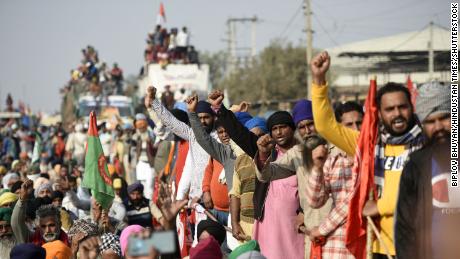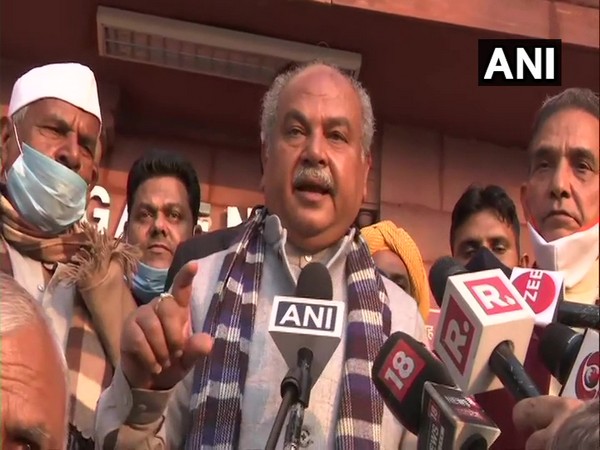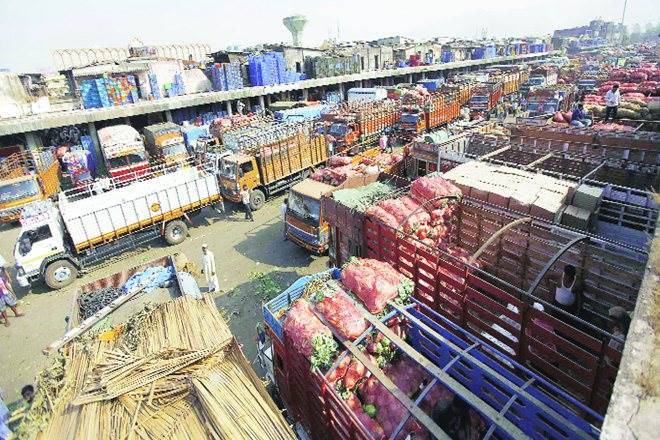Farms laws 2020 – More Benefits or Drawbacks in these laws?
 Dr. M.Rahman, Associate Professor, Galgotias University
Dr. M.Rahman, Associate Professor, Galgotias University
The three farm laws that were passed, with an aim to improve the country’s agriculture sector, by both houses of the parliament and received presidential assent in September 2020 received widespread protest from farmers across the nation. These laws – The Farmers Produce Trade and Commerce (Promotion and Facilitation) Act, 2020; The Farmers (Empowerment and Protection) Agreement of Price Assurance and Farm Services Act, 2020; and The Essential Commodities (Amendment) Act, 2020 – collectively seek to provide farmers with multiple marketing channels and provide a legal framework for farmers to enter into pre-arranged contracts among other things. The PM and many ministers in the central government claimed that enactment of these laws is historic and these would drastically improve farmers’ lives by increasing their income by selling their agricultural products anywhere in the country. However, these claims didn’t run well among the farmers and nationwide protests erupted. The farmer union’s claim that these laws would make the APMC (Mandi) system redundant, finish the minimum support price (MSP), leave the farmers at the cruel market forces and business houses and eventually ruin the farmers life. The farmer group’s mistrust on these laws resulted in thousands of farmers in Punjab, Haryana and several other states coming on the roads to protest against three farm laws since these were presented in the parliament.

Over the past one month, farmers started the fiercest protest and have laid siege to the national capital by blocking the highways to Delhi. The Modi government scrambled to find an amicable solution, but the multiple rounds of meetings between protesting farmer groups and the central government failed to reach any solid conclusion. The farmers are so angry with these newly formed laws that they are demanding nothing less than total scrapping of the laws.
Now the big questions come – Why the farmers are so angry with these laws? Why this mistrust between the farmers and the central government? Why don’t the farmers trust the words or intentions of PM Modi and its ministers who claimed passing of these laws by the parliament as the watershed/historic moment in the life of Indian farmers?
Now there are two extreme opinions that have emerged on these farm laws. While one extreme opinion is ‘it’s a death sentence to the farmers’, other extreme opinion is ‘it will drastically improve the lives of the farmers’. Now, Let us try to understand the farm laws and the key provisions in these laws, and analyse the benefits from these laws as well as drawbacks in these laws.
About the enactment of the farm laws 2020
On June 5, 2020, with an aim to improve the agriculture sector and farmers’ lives, three farm related ordinances – 1. Farmers’ Produce Trade and Commerce (Promotion and Facilitation) Ordinance, 2020, 2. Farmers (Empowerment and Protection) Agreement on Price Assurance and Farm Services Ordinance, 2020, and 3. Essential Commodities (Amendment) Ordinance, 2020 were promulgated by the union government. Since then there have been protests against these bills from the opposition members as well as farmer groups. But, rather than responding to the protests and considering the concerns of the protestors, the govt went on to pass the bill in Lok Sabha first and then in Rajya Sabha on on 17th Sep and 20th Sep respectively with severe resistance by opposition parties. These ordinances were finally converted into acts after presidential assent on 27th September 2020. Since then, there have been widespread and fierce protests of farmers across the nation. The three acts that have become contentious are:
1. Farmers Produce Trade and Commerce (Production and Facilitation) Act, 2020
2. Farmers (Empowerment and Protection) Agreement on Price Assurance and Farm Services Act, 2020
3. Essential Commodities (Amendment) Act, 2020


Now, let us try to understand the provisions made by these three laws one by one starting with Farmers Produce Trade and Commerce (Production and Facilitation) Act, 2020. The key provisions this act and its benefits as well as drawbacks associated with it without any any personal or political biasness.
Provisions in Farmers Produce Trade and Commerce (Production and Facilitation) Act, 2020.
- Alternative Trading Channels: This act permits intra and inter-state trade of farmers’ produce beyond the physical premises of Agricultural Produce Market Committee (APMC) markets and other markets notified under the state APMC Acts. In simple language the farmer can sell their produce outside government regulated mandis or any outside trade area such as farm gates, factory premises, cold storages, and so on.
- Registration/License: No formal registration or license is required by an individual or business to purchase agri-produce outside mandis. Any PAN card holders can buy foodgrains from the farmers.
- Electronic Trading: This act also facilitate direct and online buying and selling of the agricultural produce via electronic devices and the internet.
- No market fee or tax on trading outside APMC trade areas: There will be no market fee or tax on farmers, traders and electronic trading platforms for trading farmers’ produce in an ‘outside trade area’.
- Dispute settlement mechanism – This act provides for a three-level dispute settlement mechanism– Conciliation Board, Sub-Divisional Magistrate and Appellate Authority (normally district collector). No civil court will have the power to intervene.
Benefits of Farmers Produce Trade and Commerce (Production and Facilitation) Act, 2020
- Availability of alternative trading channels: Farmers will have alternative options and the freedom to sell their produce outside the APMC (agricultural produce market committee)/mandis legally and there will be no tax on such trade which may give a higher price to the farmers. They can also sell online and can get a chance to connect with the modern IT world. APMC is not considered to be the perfect practice and need improvements as per many experts.
It is to be noted that, previously sale and purchase of agri-produce could only be done in the APMC yards or Mandis in the specified area where the buyers have to pay at least the minimum support price (MSP) set by the government for specified agricultural products. At present there are 23 items on which the central government fixes MSP. The sale and purchase outside these mandis were deemed illegal as there were more chances of farmers’ exploitation on price and payment). But, this act has made it legal.
The minimum support price (MSP) is an agricultural product price set by the Government of India to purchase directly from the farmer. This rate is to safeguard the farmer to a minimum profit for the harvest. The central government sets the price for 23 commodities twice a year. These commodities include cereals (paddy, wheat, maize etc.), pulses (moong, urad, tur etc.), oilseeds (peanuts, sunflower, soyabean etc.) and commercial crops (cotton, jute, sugarcane and copra).

2. Promotes Inter-state and intra-state trade: Farmers can sell their produce within the state or anywhere else in the country and there will be no restriction on this type of trade. This will benefit the farmers that they will be able to sell their produce to the merchant wherever they get a higher price.
It is to be noted that, earlier, they were not legally allowed to sell in APMC/mandis in outside the specified areas.
3. Farmers can sell to anyone with a valid document like PAN card: There will be no need for any kind of registration or license for traders to purchase agricultural produce of farmers in the trade area outside the APMC mandi. Those holding PAN card or any other document notified by the Central government can join this trade. This will facilitate trade in agricultural products and will benefit the farmers.
Note: Trading in APMC areas/mandis need proper registration and every transaction is recorded.
4. Fast dispute settlement: In case of any dispute arising in such business, the matter will be settled within 30 days by the Sub-Divisional Magistrate. This is really good for the farmers if it’s done with seriousness and honesty.
Drawbacks of Benefits of Farmers Produce Trade and Commerce (Production and Facilitation) Act, 2020
1. No MSP and chances of exploitation on price: Outside APMC yards, MSP or minimum price is not guaranteed and there are chances farmers may be exploited on price decided by traders and the cruel market forces.
Farmer groups claim that the states where APMC/Mandi system is poor like Bihar, farmers sold their foodgrains at a price much lower than the MSP fixed by the government. The farmers in Punjab and Haryana are financially sound as compared to other states like Bihar because the former sell their products at MSP in APMC mandis thereby getting over Rs 1800 per quintal for wheat and paddy against the later getting a much lower price than the MSP.
2. Business in APMC (government mandis) may suffer – Since there will be no taxes/fees in outside trade areas, it would lead to uneven competition and trading would move from govt mandis to private trade areas and ultimately the APMC/govt mandis will be finished. This will create two types of markets – one with tax and other without tax. This is a favour to those trading outside APMC trade areas.
As claimed by the President of the Maharashtra Rajya Bazaar Samiti Sahakari Sangh, Dilip Mohite Patil, around 100-125 market committees (mandis) in Vidarbha and Marathwada regions have reported almost no business and are on the verge of closure after the announcement of the central Ordinance in June 2020.
4. Loss of income of those engaged in APMC: There are many traders and agents engaged in facilitating the sale and purchase of the farmers’ products. Some invested money in their shops or godowns in the APMC area.
Farmer groups claim that since there is no fee/taxes on outside trading areas, business may shift from APMC areas to outside trading areas. The loss of business in APMC areas would endanger the livelihoods of many persons working in or engaged with these areas.
It is to be noted that farmers selling in government mandis have to shell out around 10% as mandi fees and taxes.
5. No judicial support: Since there will be no intervention of court i.e. judicial support (as per this act), the farmers will be at the mercy of the government authorities (SDM, Collector) In case of dispute. People have more trust on courts than that on government babus, and so its a drawback.
6. Poor regulation on traders outside govt mandis: As per the act, no formal registration or license is required and anyone with a PAN card can buy from farmers outside mandi areas. With this, farmers will be exposed to the risk of fraud due to the entry of people without license or registration. There could be more chances of cheating/fraud with emergence of fly-by-the night operators.
Conclusion
The Farmers Produce Trade and Commerce (Production and Facilitation) Act, 2020 has good intention but without strong safeguards to the farmers. It would have been better, if farmers concerns were taken into consideration by the government while formulating the bill. The government should remove the drawbacks associated with this law so that the farmers can realize the full benefits out of its implementation and improve the nation’s economy. The government should improve the deficiencies in APMC/mandis, assure MSP or develop some pricing mechanism so that the farmers don’t have to play in the hands of cruel market forces while selling in areas outside APMC, impose fee/taxes in outside trade areas at par with the APMC trade areas so that there is a level playing field between the two areas, provide judicial support in case of dispute not settled by SDM or collector, and provide for registration/regulation of buyers outside APMC (mandi) areas so at that farmers won’t be exposed to the risk of fraud due to the entry of people without license or registration. So, it is to conclude that this law should not be repealed, rather the government should improve/amend it so that it becomes good for the farmers and the nation.
For provisions, benefits and drawbacks of other two farm laws CLICK HERE
5 thoughts on “Farms laws 2020 – More benefits or Drawbacks in these laws?”
Relevant and good information
Very correctly put up the facts relating to the ongoing issue
Thanks Dr Tanwar
Very informative
Very correctly put up facts relating to the on going issue.